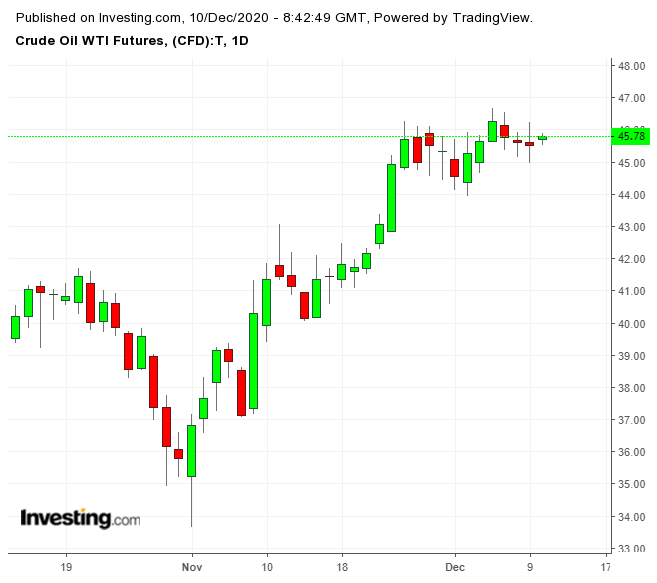The oil market is still obsessed with the promise of coronavirus vaccines and the hope that they will lead to an economic revival.
If you blinked, you might have missed the bump in oil prices caused by a terrorist attack in Iraq, but the market’s reaction provided important information that traders should understand.

When it comes to demand, the market seems little concerned with what is happening right now, placing bets on a future improved by vaccines instead.
As well, in the longer term, we will see more forecasts as the year comes to a close, and traders must understand the limitations of these forecasts.
Below are 3 oil market developments seen this past week and lessons they reveal about current market dynamics:
1. Price Spikes From Terrorism In Iraq
Prices spiked but only briefly on news of an incident in Iraq. New sources reported that explosions by terrorists set ablaze two wells in northern Iraq. However, more information revealed that the attack occurred at a small oil field in Kirkuk which produces only 25,000 bpd and that the fires did not impact production at the field.
Lesson: The short-lived reaction exposes the importance of Iraq and Iraqi production to current market sentiment. As the second-largest producer in OPEC right now, Iraq has been the biggest over-producer. (According to Platts, Iraq adhered to its quota in October and November, though it is supposed to be under-producing its quota to compensate for earlier over-production).
While it makes sense that the market would care about disruptions to Iraqi production and fear the worst, this Iraq news was the first, in a while, to be the cause of rising prices, outside of coronavirus vaccine news.
The Iraqi government in Baghdad has blamed its failure to comply with its OPEC production quotas on output from northern Iraq, which is operated by the Kurdistan Regional Government and can be distributed independently of Baghdad.
Information from Argus shows that Kurdish production remained consistent at 450,000 bpd while production from southern Iraq fluctuated. A more extensive attack on northern Iraqi oil fields might have necessitated some production shutdowns and could have impacted Iraq’s oil supply.
However, that was not the case this week, so the spike in prices only lasted until the extent of the situation was clarified.
2. Disconnect Between Sentiment And U.S. Demand Data
Gasoline and jet fuel demand in the U.S. is sluggish.
The weekly EIA data show a build in gasoline stocks last week, and data from GasBuddy indicate that gasoline demand in the U.S. is down this week compared to the previous one. (Last week saw atypically high gasoline demand because of post-Thanksgiving travel).
Although U.S. air travel hit a high last week since shutdowns began, it was the lowest Thanksgiving-related travel figure since 2008. Gasoline consumption in the U.S. over Thanksgiving was the weakest in 20 years, according to OPIS.
Lesson: This does not bode well for Christmas-related travel. However, the oil market doesn’t seem to care that much about demand in the U.S., because even though the EIA reported a 15.2 million barrel build in crude oil stores (11% above the 5 year average for this time of year) and a 4.2 million barrel build in gasoline stores (5% above the 5 year average for this time of year), WTI oil futures only lost 0.18% for the day.
This has been characteristic of oil prices since news of the vaccine hit markets. The question is whether this optimism tied to vaccine news will continue until the demand data matches the expectations.
3. Conflicting Oil Forecasts
Earlier this fall, I discussed BP’s controversial Energy Outlook 2020 report, which argued in favor of a scenario in which oil demand actually peaked last year. The other two scenarios it offered were not quite as aggressively dismal on oil demand, but still some of the most depressing in terms of the future of oil demand. I argued that these forecasts should be understood in the context of BP's (NYSE:BP) chosen long-term strategy of swiftly shifting away from oil and gas assets.
This week, Goldman Sachs offered a completely different forecast for the future of oil.
Goldman sees oil demand rising even as efforts to transition to renewable energies mount. According to Goldman’s head of commodities research:
“We believe it’s the beginning of a structural bull market not only in oil, but across the entire commodity complex.”
Lesson: It is possible that this forecast is designed to support Goldman Sachs’s positions on commodities, including oil, but the lesson here for individual traders is that for every forecast predicting the end of oil, there will be another forecast—just as rigorously assembled—predicting a bullish future for oil.
When deciding whether or not to take these projections seriously, it is important to understand the motivations that influence the forecasters and their organizations and to realize what beliefs are driving them.
Goldman, for example, is not optimistic about improvements in battery technology, which are needed to store renewable energies for longer periods and improve the feasibility of electric vehicles. BP, on the other hand, is very optimistic about the adoption of electric vehicles and bases its forecasts on electric vehicle policies adopted by various governments. Forecasts should be viewed as indicators of where particular institutions are investing their money and efforts.
